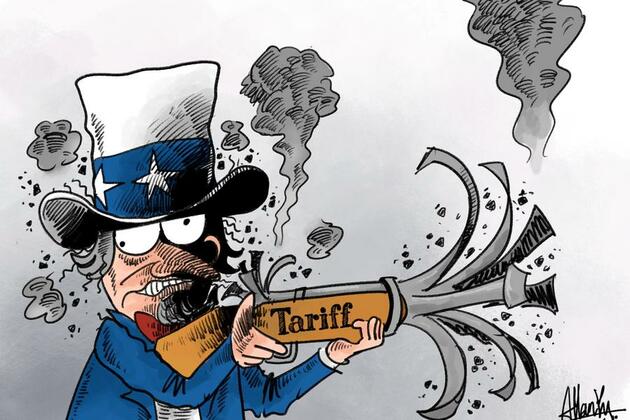Column: Misinformation or miscalculation -- Evaluating American tariff policy and its global consequences
Xinhua
11 Jun 2025, 15:16 GMT+10

Economic policy must not be driven by populist slogans or short-term political gains.
by Zheng Yin
U.S. officials have been vigorously promoting Trump's tariff policy recently. Last month, White House Press Secretary Karoline Leavitt tweeted on X: "American manufacturers overwhelmed with orders after Trump's crackdown on China."
The tweet quickly sparked debate. While some heralded it as proof that trade toughness has paid off, the reality behind such optimism is far more complex. It reflects a broader narrative of economic nationalism that, while politically potent, often overlooks basic economic logic and long-term strategic thinking.
At the core of the United States' trade approach lies "reciprocal tariffs" -- the idea that the country should mirror foreign tariffs with equal or greater duties of its own. Though this might sound like fair play, international trade is not a zero-sum game. It's an intricate system built on multilateral agreements, economic interdependence and global rules. Imposing tariffs unilaterally, without regard for these structures, disrupts markets and undermines the U.S. credibility in global trade.
Moreover, the logic behind these tariffs has significant flaws. They treat trade deficits as inherently bad and assume that tariffs can correct them. In reality, trade deficits are shaped by macroeconomic forces -- currency strength, savings rates and capital flows -- not merely tariff schedules. Punitive tariffs aimed at "fixing" trade deficits address only symptoms, not causes.
Ironically, the tariffs ended up harming many of the U.S. industries they were intended to protect. China responded with firm countermeasures, imposing its own tariffs on U.S. goods -- especially agricultural products -- hurting American farmers and manufacturers alike. Despite claims like "trade wars are easy to win," and Leavitt's assertion that U.S. factories are overwhelmed with orders, data tell another story.
Washington was forced to spend billions in subsidies to offset farm losses, while companies struggled with rising costs of imported parts. The net effect has been supply chain chaos, business uncertainty and a lack of any clear strategic gain.
Leavitt's tweet underscores the U.S. government's reluctance to acknowledge these failures. Even in the face of weak economic data, they continue to frame tariffs as strong negotiating tools. In practice, however, the policy has been reactive and incoherent -- a political tactic rather than a comprehensive strategy.
Globally, these policies have triggered a reevaluation of the U.S. trade relationship. Countries are pivoting away from reliance on the U.S. market, investing instead in regional integration. The EU and Japan have signed a free trade agreement, Britain is deepening ties with India, and Asia is advancing the Regional Comprehensive Economic Partnership (RCEP). Trade is moving toward a more multipolar, less U.S.-centric model -- an outcome likely unintended by Washington.
China, as the world's second-largest economy and largest trading nation, has taken a principled and measured stance. It firmly opposes U.S. unilateralism and protectionism, calling such tariffs a form of economic coercion that destabilizes global markets. China has implemented targeted counter-tariffs, expanded its free trade partnerships and increased domestic support for innovation and industrial upgrading. In Q1 2025, China's economy grew by 5.4 percent, and its trade surplus continued to expand -- a testament to its adaptive strategies and long-term resilience.
Furthermore, recent U.S.-China consultations in Geneva signal a potential path back to dialogue. China has reiterated its position: negotiations must be based on mutual respect, equality and mutual benefit -- principles essential for any sustainable resolution.
Economic policy must not be driven by populist slogans or short-term political gains. America's tariff-first approach may rally a political base, but it has delivered few tangible outcomes. Sustainable trade policy must be grounded in transparency, cooperation and global norms -- values that stand in stark contrast to the unilateral approaches seen in recent years.
Leavitt's optimistic tone may capture headlines, but without facts to back it up, such claims ring hollow. The pressing question now is whether the United States can learn from this chapter and chart a more balanced and forward-looking path in global trade.
Editor's note: The author is an international affairs observer.
The views expressed in this article are those of the author and do not necessarily reflect the positions of Xinhua News Agency.
 Share
Share
 Tweet
Tweet
 Share
Share
 Flip
Flip
 Email
Email
Watch latest videos
Subscribe and Follow
Get a daily dose of Illinois Intelligencer news through our daily email, its complimentary and keeps you fully up to date with world and business news as well.
News RELEASES
Publish news of your business, community or sports group, personnel appointments, major event and more by submitting a news release to Illinois Intelligencer.
More InformationNorth America
SectionU.S.-LOS ANGELES-CURFEW
(250611) -- LOS ANGELES, June 11, 2025 (Xinhua) -- People are arrested by policemen as they do not leave the Los Angeles downtown area...
Column: Misinformation or miscalculation -- Evaluating American tariff policy and its global consequences
Economic policy must not be driven by populist slogans or short-term political gains. by Zheng Yin U.S. officials have been vigorously...
MEXICO-MEXICO CITY-CHAPULTEPEC ZOO
(250611) -- MEXICO CITY, June 11, 2025 (Xinhua) -- Tourists visit Chapultepec Zoo in Mexico City, capital of Mexico, June 10, 2025....
(SP)CANADA-TORONTO-FOOTBALL-CANADIAN SHIELD TOURNAMENT-CANADA VS COTE D'IVOIRE
(250611) -- TORONTO, June 11, 2025 (Xinhua) -- Nicolas Pepe (L) of Cote d'Ivoire vies with Derek Cornelius of Canada during the Canadian...
"Modi at G7 a chance to reset India-Canada ties amid Khalistan tensions": Canadian podcaster Josh Udall
Ontario [Canada], June 11 (ANI): As Prime Minister Narendra Modi participates in the G7 Summit in Kananaskis, Canada, from June 15...
Semiconductors emerged as a key growth driver for South Korea's exports rebound in early June
New Delhi [India], June 11 (ANI): South Korea's exports witnessed a robust recovery in the first 10 days of June, climbing 5.4 percent...
International
SectionGreta Thunberg, others stopped while attempting to break Gaza blockade
WEST JERUSALEM, Israel: Israeli forces stopped a boat heading to Gaza and detained Greta Thunberg and other activists on board early...
Fresh IVF error raises alarm over clinic safety and oversight
MELBOURNE, Australia: A second embryo mix-up in just two months has pushed one of Australia's largest IVF providers back into the spotlight,...
Trump and Musk feud goes viral on X
WASHINGTON, D.C. A public fight between U.S. President Donald Trump and billionaire Elon Musk has taken over social media, especially...
Human traffickers exploit new deadly route from Africa to Europe
DERA BAJWA, Pakistan: Amir Ali, a 21-year-old man from Pakistan, dreamed of going to Europe for a better life. He was promised a visa...
ispace lander crashes on moon; Japan faces new lunar setback
TOKYO, Japan: Japan's hopes for a foothold in commercial lunar exploration suffered a second blow this week after Tokyo-based startup...
FSB claims Russian professors linked to British Council espionage
MOSCOW, Russia: Russia's principal security agency, the Federal Security Service (FSB), has accused British intelligence of using the...












